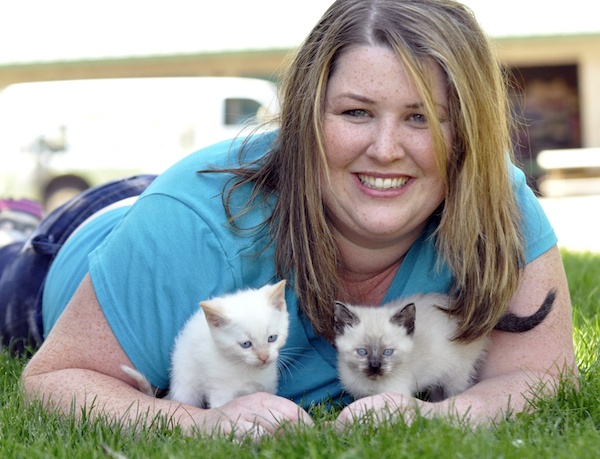MARYSVILLE — Marissa Brugger has saved hundreds of lives.
She is not a doctor or an emergency responder. She is not a nurse or a combat medic. She is a foster mom — a kitten foster mom.
Brugger is one of more than 100 foster parents of young kittens and puppies, who help to save the lives of animals that otherwise would have been euthanized. The program was started by Lani Kurtz, animal welfare director at the Northwest Organization for Animal Help, or N.O.A.H.
“I’ve been fostering for over a year here at N.O.A.H,” said Brugger, a Marysville resident, who didn’t expect to be a foster mom.
“It really just came down to my very first foster — Raja. It was a large litter and she kept getting pushed out. She was less than two days old,” she said. “I spent all my time with her trying to get her going. It was a rocky road but she’s better now.”
Brugger still has Raja, but when she’s not at work she is also helping to rescue other small kittens. Since being at N.O.A.H., she has fostered 57 cats and kittens, and she fostered 85 while living in Idaho. The kittens range from newborn litters with their mothers, to weeks-old kittens that need a few extra pounds before they can be adopted.
“It is very rewarding,” said Brugger. “It’s fun to see these adorable kittens get more adorable as they grow. And it provides a service — these kittens might not make it if they weren’t fostered.”
The program began in May 2010 and has saved a total of 2,223 kittens and 426 puppies. N.O.A.H. partners with other animal shelters across the state to take in adoptable animals that are overflow in other shelters.
“A lot of these shelters don’t have foster programs,” said Kurtz. “Thousands of animals were being euthanized simply because they were underage.” Kurtz emphasized that those shelters did not have the resources to bring the animals to full health, which sometimes requires bottle-feeding orphaned infants.
“When we started the program we called all of our partner shelters to let them know what we were doing,” said Kurtz. “Now they call us.”
When a shelter calls to say that they have animals who need foster homes, N.O.A.H. reaches out to their foster families to find a home before agreeing to take in the litter.
“N.O.A.H. will work with what you have,” said Brugger. “They provide food and you just provide your time.”
Anyone can foster, from one kitten at a time, to multiple litters of dogs and puppies.
Arlington’s Deb Quinn is a puppy foster mom, and after housing litters of puppies in her laundry room, her husband Bruce had a puppy fostering facility built on their property. The building, which has the look of a bright yellow mother-in-law house, is complete with dog-related artwork on the walls and classical music playing softly to calm the puppies. A bed with a warming pad keeps the litters comfortable, while a doggie door leading to a covered and fenced outdoor space helps to potty train. She is currently fostering two mother dachshunds and two litters of puppies. She has fostered roughly 100 animals.
“It’s hard to give them up, but you know they are going somewhere good and you saved their lives,” said Quinn. “It’s the best.”
Quinn and her husband are retired and self-proclaimed homebodies. “This is kind of our thing to do in the country of Arlington — save puppies.” Quinn was most moved by a rescued litter of malamutes and their mother, who she called Mama, which were seized from the home of an animal hoarder. “He had 27 malamutes in a 1,000-square-foot space,” she said, visibly upset. “The filth was unbelievable.” But she spoke with fondness of Mama, who was later named June. “I had her from the day she gave birth and I spent a lot of time with her, giving her sponge baths. When she came in she was bald, with sores from sitting in filth. But I watched her get better and better.” According to Quinn, June was adopted to “an awesome home” with owners who have brought her back on several occasions to visit with the woman who helped save her life.
The foster program at N.O.A.H. started with 40 foster families, drawn from their pool of regular volunteers. Today, they have more than 100 families who have signed on to help. “Most of our fosters are in the Marysville and Arlington areas, but some are as far away as Seattle or Camano Island,” said Kurtz. “We are always looking for more foster homes. We can’t take a litter unless we have a home to send them to.”
Right now, the foster program assists more than 20 shelters, but Kurtz hopes to grow. “We’d love to extend help to every shelter in Washington,” she said. “The whole point is to save as many animals as we can.”
For more information or to become a foster call N.O.A.H. at 360-629-7055, visit its website at www.thenoahcenter.org.



